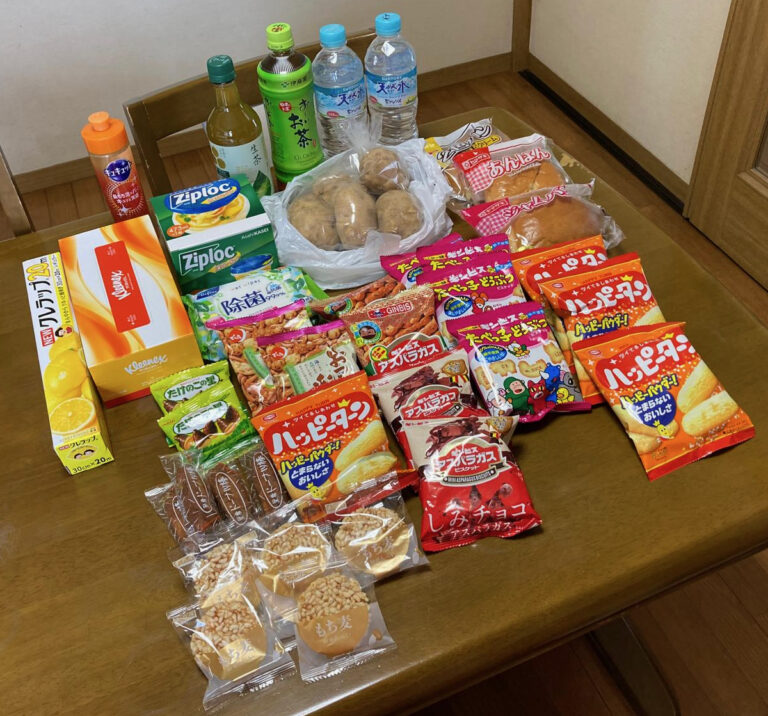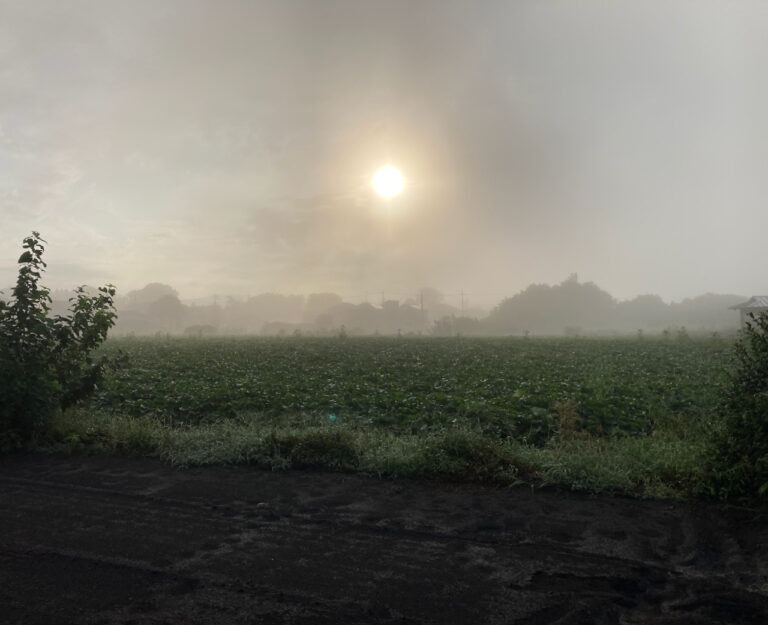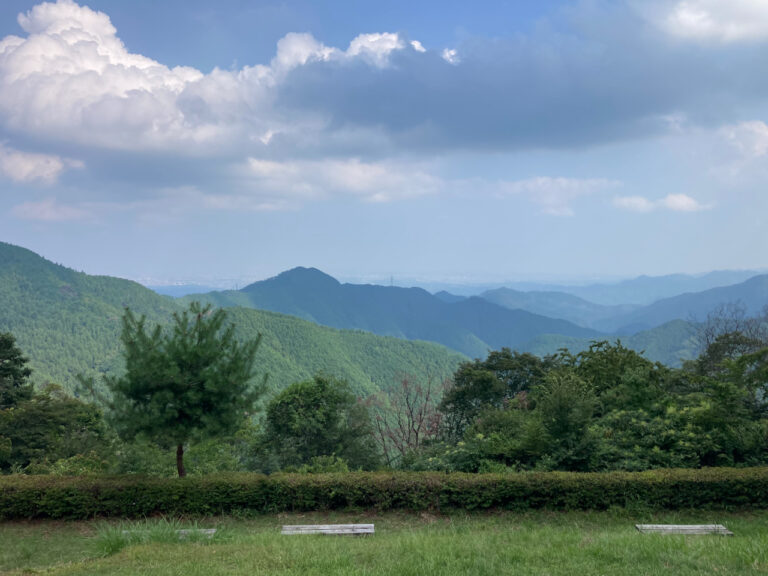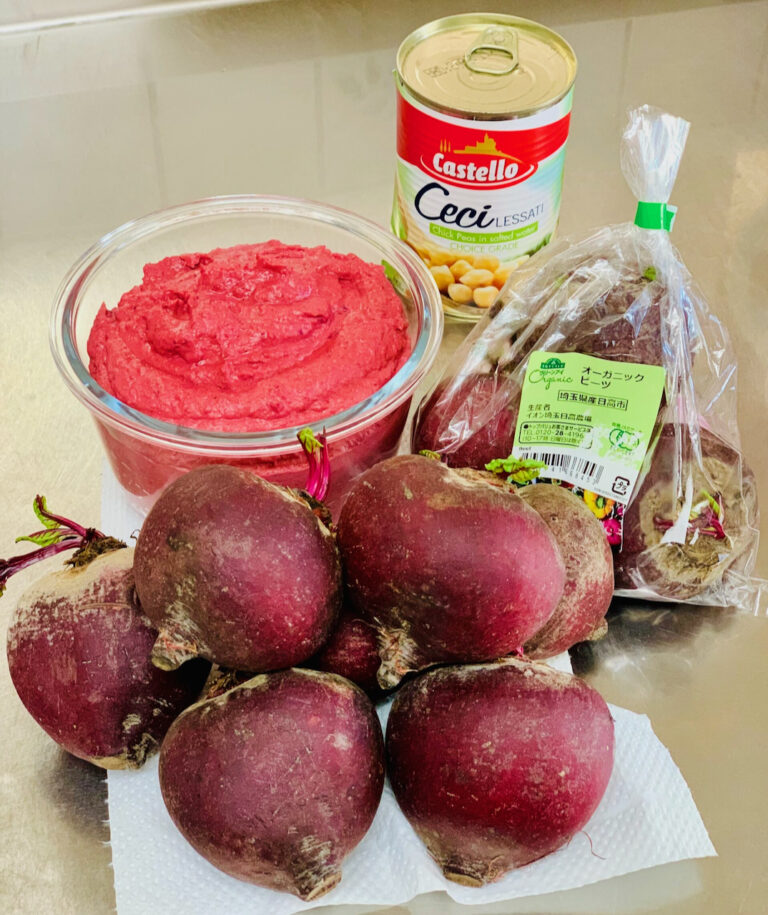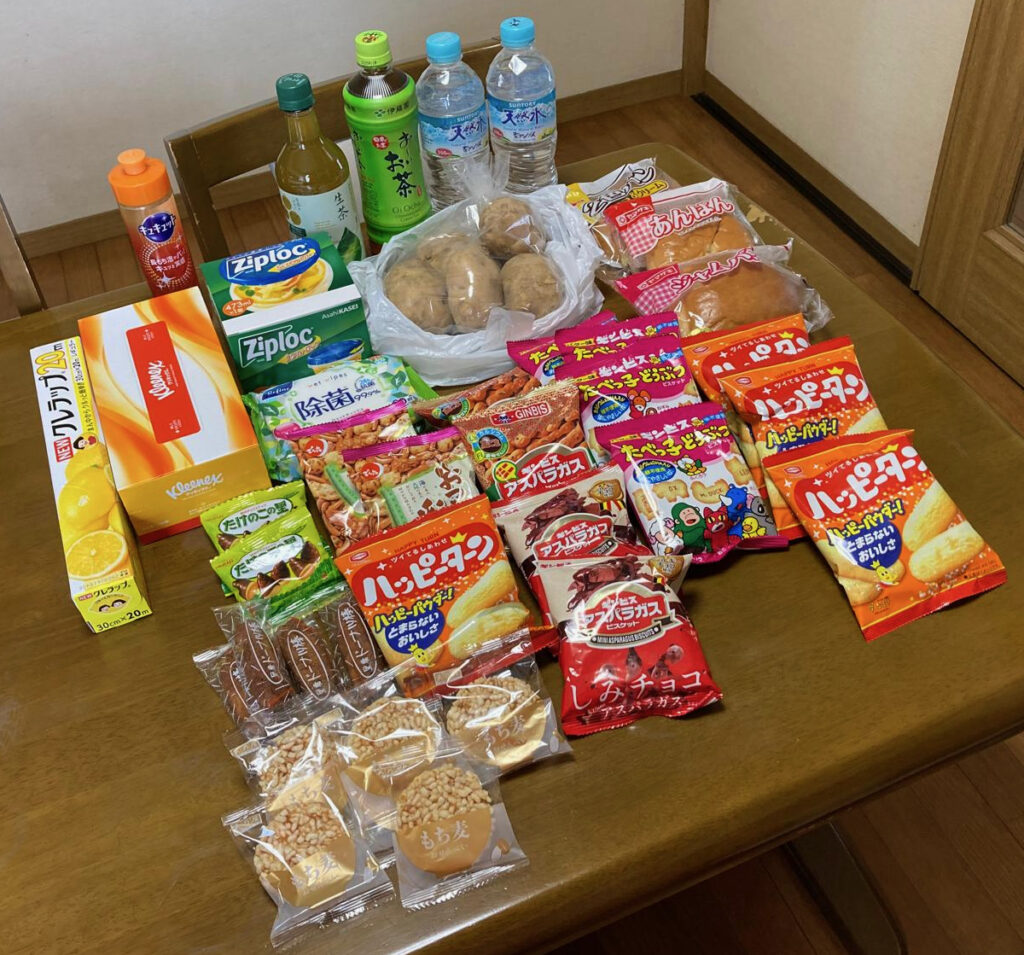
This may look like a post-shopping trip photograph, but in fact, it is the haul that we brought home with us after the recent shimin undōkai (citizens’ sports day/市民運動会). Monday 13th October was a national holiday called tai’iku-no-hi (体育の日), which means P.E. day, sports and health day, or something to that effect, so events such as the one that we took part in on Sunday 12th are a long-running tradition.
A recent TV show included some footage from the Showa era in which one of the interviewees said that he had stayed up all night for several days organising a sports day that was clearly going to be attended by hundreds of people. As with many community activities, fewer and fewer people have been taking part in citizens’ sports days of late. This isn’t just because the population of Japan is shrinking so rapidly. It’s also because younger people are less interested in events that for them feel too much like an obligation and involve sacrificing their free time to attend meetings and so on, even if no one has to stay up all night these days.
Similarly, since moving to our current house 14 years ago, the Muzuhashis hadn’t t been to a single citizens’ sports day. Admittedly, one or two were cancelled due to COVID, but we also tend to be busy on weekends and are, to be honest, antisocial. This year, however, we are the so-called hanchō (班長/group leader) for the houses in our immediate neighbourhood. Among other things, this involves distributing the city newsletter, circulating flyers about events and administrative matters, and giving annual gifts to everyone in the neighbourhood who is 70 or older.
Last month I joined another community event for the first time, which entailed gathering at 8:00 a.m. on a Sunday morning and dispersing around the district (we live in the rather mundanely named chūō-ku/中央区 – central district) to pick up any rubbish that had been discarded or accumulated at the roadside. To be fair, I had intended to do so for several years but always managed to forget on the day, and indeed, there was something very satisfying (for someone with mildly OCD tendencies, at least) about clearing up cans, glass and plastic bottles, food wrappers, convenience store plastic bags, and other items that included a traffic cone, chicken wire, and a hubcap.
I had anticipated being assigned to a particular part of the district, but was told that anywhere would be fine, so chose the hill that I drive down when I take M Jr I to school each day. There I got chatting to a local woman who told me about kogomi and tara (ostrich fern and palmyra), wild vegetables you can pick from the woods on either side of the road to be made into tempura. Her husband, incidentally, was a rather grumpy old man who suggested heading back to the meeting place within about ten minutes, but his wife and I decided to continue downhill towards the river and do a little more in the way of community service before heading home for breakfast.
One of the men at the meeting point who was sorting the rubbish for recycling knew of me.
‘You’re from England, aren’t you?’ he said.
‘Yes, I am,’ I replied.
‘I love the The Beatles.’
‘Really? Me too.’
‘Actually, I play their songs on the guitar and sing a little. How about you?’
I told him that I used to play a couple of Beatles songs in a jazz band and that my guitar playing is so rusty as to be almost embarrassing.
But anyway, on the morning of citizens’ sports day, I went to the same meeting place at 7:30 and helped the same group of men load chairs, tables, and collapsible gazebo-like tents onto the back of a truck that was owned by my immediate next door neighbour, who runs a fertiliser business and can often be seen during the rice planting season loading and unloading pallets with a forklift.
At the sports ground that M Jr II’s elementary school uses for its own sports days, we unloaded the truck at our allotted plot alongside people from about ten other districts. It had rained heavily the previous day, and Mrs M and myself both secretly hoped the event would be cancelled, but the ground wasn’t as wet as expected, and the signal that it would go ahead (volleys of fireworks launched from several locations around the town) woke up anyone who was still asleep at 6:00 a.m.
Many towns and villages in Japan still play music over loudspeakers at an equally early hour and in fact, a few years ago I successfully campaigned to have our own municipality push this tradition back two hours to 8:00 in the morning and play a shorter, quieter tune. The same music also rings out at midday and 5:00 p.m. and is frankly annoying. You could say that the six o’clock fireworks are just as much of a nuisance, but I suppose once or twice a year (they also signal other festivals and events) is nowhere near as bad as every single day.
M Jr I was cramming for a mid-term test at her middle school, so she stayed at home and M Jr II very reluctantly agreed to come with us. He told us over breakfast that his homeroom teacher had asked the class the other day how many people were planning to attend citizens’ sports day. ‘Literally no one put up their hand,’ he said, but thankfully, a handful of his friends had also been dragged along by their parents and grandparents, so he didn’t have quite as miserable a time as he had been expecting. More to the point – and to get back to the photo at the top of this post – we were showered with gifts throughout the morning. Even if you came in last place – as our team did in the tyre-rolling race – you still came away with a roll of cling film, a Tupperware container, a bottle of washing up liquid, or a snack of some kind. In a typically Japanese ‘me too’ moment, the so-called ‘shopping race,’ which involved running to pick up a laminated picture of an item of groceries before running to pick up the matching item and carrying it to the finish line, was for women only. Mrs M happened to be in the last group of mums to take part, and was allowed to keep her bag of potatoes. There was a seemingly limitless supply of plastic bottled drinks, and another race that is a staple of kindergarten and elementary school sports days, the pan kui kyōsō (パン食い競走/bread eating race).
In the old days this really did involve eating bread while running, but what with COVID and modern-day compliance, the version in which we participated entailed running a quarter of a lap of the track towards a line of snack bread items wrapped in plastic bags and hanging from a line of clothes pegs, grabbing one with your teeth, and running another quarter of a lap to the finish line. I didn’t exactly cover myself with glory in this race, either, and cheated by using my hands to guide the bagged bread towards my mouth before losing my grip and dropping it on the way to the finish line. Still, the vast majority of races were in no way competitive, and particularly given the high proportion of OAPs, conducted at a very leisurely pace. The anticlimax, if you will, was an event in which all of the over-seventies jogged, walked, or shuffled from one end of the sports ground to the other, on the way collecting a goodie bag of treats and household goods.
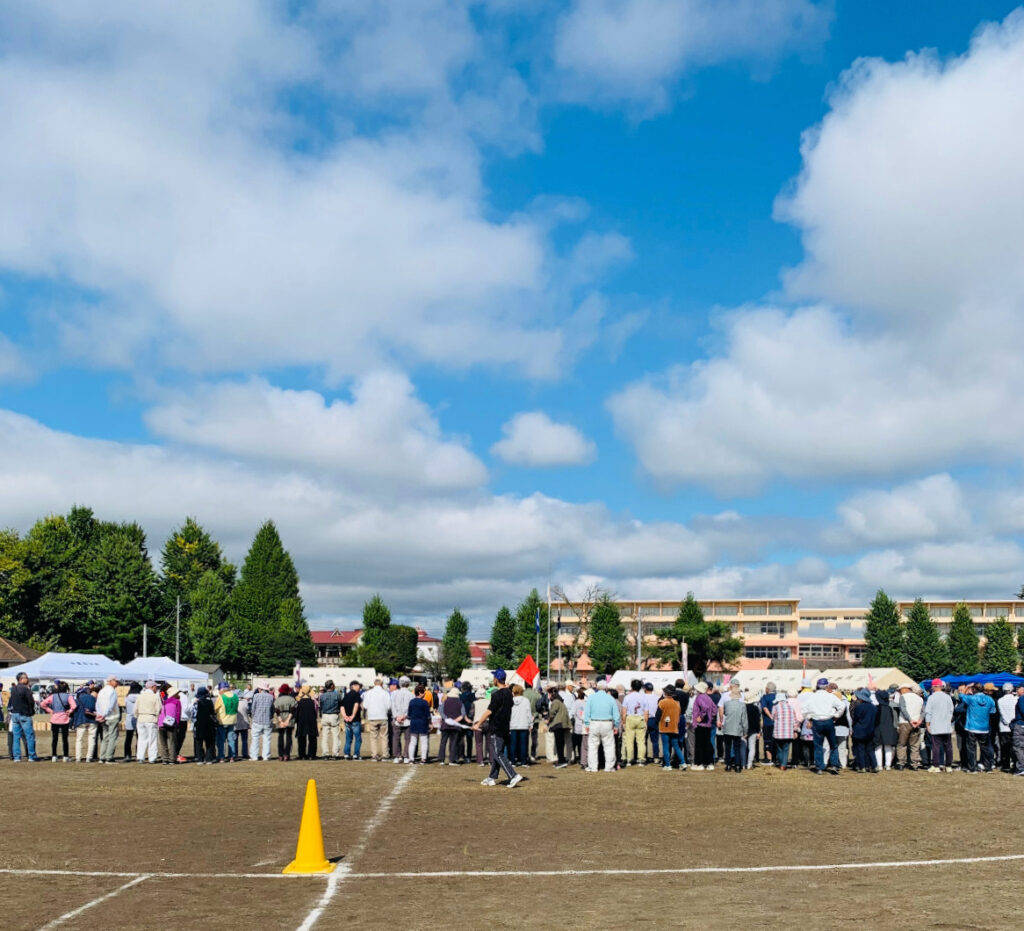
Citizens’ sports days used to take all day, with people bringing saucepans of home-cooked curry, bento boxes, or full picnic lunches, which they ate before the competition continued into the afternoon. Today, though, the final race of the day coincided with the midday burst of music from the loudspeakers. At a mere 54 years old, I was one of the younger members of my district team and had been persuaded to take part in five or six different races. Such was the case with the relay, but this time, as the competitors gathered at the side of the track, I was suddenly surrounded by high school and university students, who instead of wearing fleeces and slacks were in shorts and T-shirts. Some were even stretching in preparation for the race. My biggest worry was not that my team would lose, but that I would injure my knee from sprinting, which is something I never do these days, so I did some rudimentary stretches of my own. In an Olympic-style development, we walked a lap of the track to the applause of the crowd while holding placards with our team names on them. It was at this point that I decided to hand over my glasses and baseball cap to Mrs M, as somehow they no longer seemed competitively appropriate.
Like the sack, three-legged, and egg-and-spoon races from the British school sports days of my youth, the other events were designed to be fun rather than athletic, and as with the pan kui kyōsō, there were at least two or three I had never seen or competed in before. Another first for me had come after the opening ceremony and speeches, when everyone spread out across the sports ground for NHK Rajio Taisō (ラジオ体操/radio exercises), which is a century-old tradition and the Japanese equivalent of those sprightly Chinese senior citizens who gather in the park of a morning to do tai chi. Rajio Taisō is broadcast on TV and radio three times a day, and features a chirpy and old fashioned-sounding NHC presenter encouraging listeners and viewers to perform five or ten minutes of basic stretching – on this occasion, we were under the guidance of an only marginally less chirpy member of the residents’ association.
In the end, Mrs M, M Jr II and I had a surprisingly enjoyable morning and came home feeling that we’d done our bit for the community as this year’s hanchō. Perhaps we had also contributed in some small way to upholding the Japanese tradition of citizens’ sports days (a sports day in the area where we used to live has apparently disappeared for good), not to mention the Tai’iku-no-hi bank holiday itself, which we have enjoyed for years without doing any sports at all.
As I helped unload the chairs, tables, and tents back at our original meeting point, the Beatles fan suggested that we get together for a jam session and I invited him to knock on our front door one day. The principal at M Jr II’s elementary school had also asked if I would be interested in joining the PTA ekiden (駅伝/long-distance running relay) team, so citizens’ sports day also succeeded in dragging me away from my computer, out of the house, and into some much-needed social interaction.
